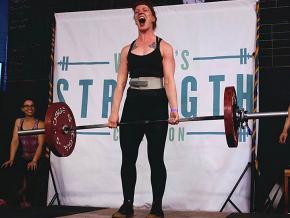Why I’m boycotting USA Powerlifting
is a powerlifter with Solcana Fitness in Minneapolis. She is currently boycotting USA Powerlifting until it changes its bigoted policies toward transgender athletes.
THIS PAST fall, I competed in my first powerlifting meet. I’d first taken up the sport, piecemeal, seven years earlier when confronting the health consequences of a wholly unathletic childhood (and adolescence, and early adulthood).
I ordered weightlifting books geared to women and was dismayed to find that book after book opened by reassuring the reader that her muscles would not become big and unsightly from lifting weights. A sense of peevish defiance forged the first athletic aspiration of my life: Fuck that, I thought, I’m gonna be huge.
And then, after years of intermittent work followed by months of intense training, there I was on the platform. Along the way, I’d joined a feminist, all-gender team dominated by women; several of us had the same experience of arriving at the meet, looking around at the assembled athletes from across the state and thinking with bemusement: Oh right, men can lift, too.
I loved competing. I loved the way my hard, competitive drive fused with a sense of mutual celebration and camaraderie among the lifters. I loved the way that competition had spurred me to train harder than I ever had before. I signed up for the next meet I could.

And then last month, a woman on my team, JayCee Cooper, was told that she could not compete at the upcoming women’s state championship meet because she is trans. Soon after, USA Powerlifting (USAPL) put out an appalling statement banning transgender men who use hormones as part of a medical transition and banning all transgender women.
In response, athletes and teams around the country have started organizing against bigotry in our sport with open letters, petitions for powerlifters and for everyone, boycotts, and planned direct actions (one of which you can read about on this site soon). Even my congressperson got involved.
Some of our arguments are detailed: USAPL’s policy isn’t based on science. Some are simple: If our sport is going to be segregated by gender, everyone needs to be allowed to compete as their own gender. But one thing I think hasn’t gotten enough attention is USAPL’s argument — because it’s infuriating in a particularly instructive way.
USAPL says that banning trans women is necessary — and permitted under the International Olympic Committee’s standards that generally allow trans athletes to participate in sports with their own gender — to achieve “fairness for female athletes.”
Clearly, the policy is unfair to female athletes like my teammate JayCee, who can’t compete because she is trans. But from my perspective as a cis woman who lifts, it strikes me that USAPL’s conception — or at least, the conception of the man responsible for the trans ban, USAPL President Larry Maile — of “fairness to female athletes” suggests that they have profoundly misunderstood their own sport.
WOMEN SPEND our lives being told, in ways enormous and tiny, that our bodies are decorative and belong to others to use and to judge; that we are weak; and that, literally and figuratively, we must not take up too much room.
And then some of us join a sport where we are celebrated for our strength, where it is an advantage to grow and take up space, and we learn to love not how our bodies look, but what they can do.
We don’t only get the pride and joy of moving more weight than we ever thought we could. Lift by lift, meet by meet, over years of charting our own progress and being cheered by our teammates, we also get to try out a less constraining set of values about what our own bodies are for.
These are fundamental facts about what lifting means for so many women. I believe they are part of why so many of us instinctively recoiled at the idea that anyone gets to judge which women are sufficiently feminine to lift.
The petitions, letters and direct actions are being organized by groups like the Women’s Strength Coalition and by teams led and populated by women. We know what fairness to female athletes means, and it doesn’t mean any committee deciding who counts as a real woman.
We can learn something from the struggle for equal access to bathrooms. Bathroom bans harm trans people the most. They also have the consequence that less stereotypically feminine women, whether they are trans or cis, get picked out for scrutiny and harassment. Gender tests hurt women even when we pass the test.
Any real effort to impose a trans ban in powerlifting will end up targeting women, cis or trans, who don’t fit some ref’s or meet director’s ideas about what a real woman looks like.
That’s unacceptable in any context. But it’s an especially bitter irony in a sport that is so liberating precisely because it helps to liberate us from those stereotypes. This is the sport, after all, that lets us aspire to be huge. By supposedly trying to protect us, USAPL — led by one bigoted man’s idea about what female athletes need — is actually taking something precious away from us. We are fighting to keep it.
My teammates trained hard for Women’s State. JayCee and other trans athletes had the right to test their work in competition taken away from them. The cis members of my team decided that we also can’t lift at meets that don’t accept trans athletes.
We are athletes who love our sport and, although lifting plays a different role in each of our lives, all of us have serious personal goals that we have made commitments to achieve. We are making athletic, personal, and financial sacrifices (in the form of expensive memberships and registrations forfeited) to boycott.
Fairness to female athletes means letting all of us lift.


